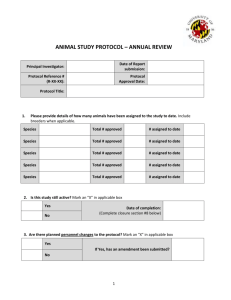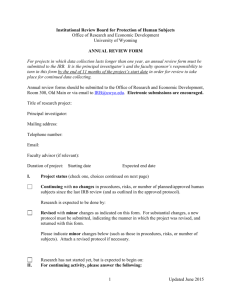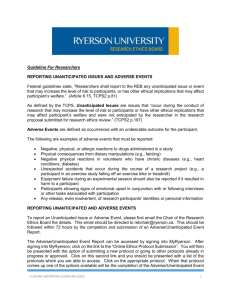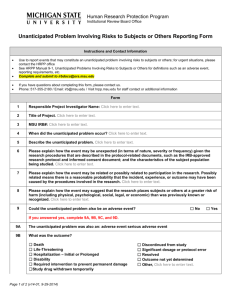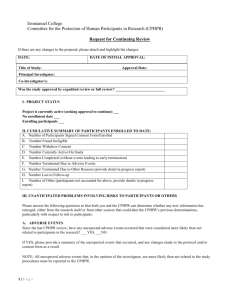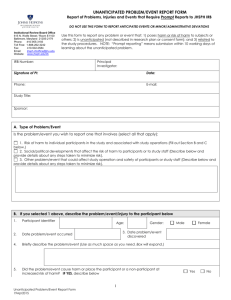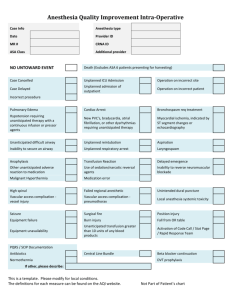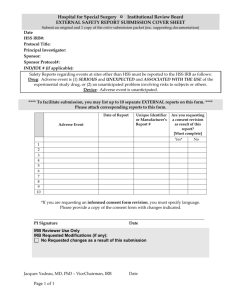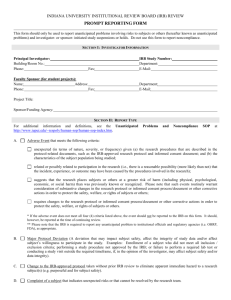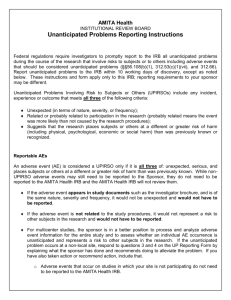Unanticipated Problem / Adverse Event Report Form
advertisement
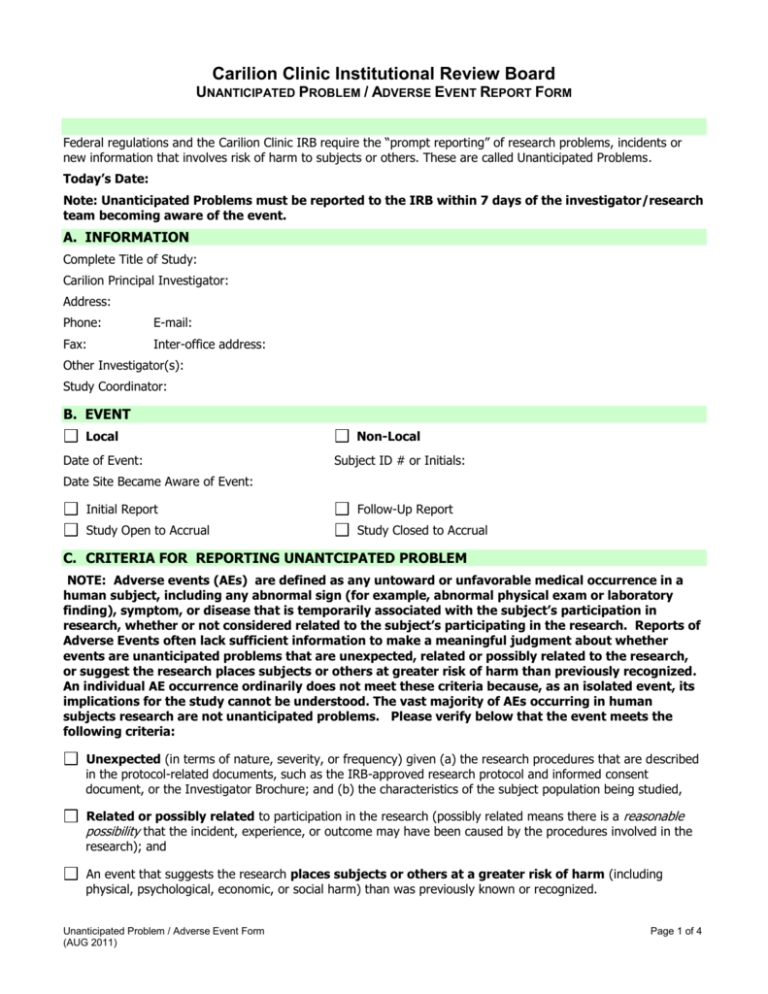
Carilion Clinic Institutional Review Board UNANTICIPATED PROBLEM / ADVERSE EVENT REPORT FORM Federal regulations and the Carilion Clinic IRB require the “prompt reporting” of research problems, incidents or new information that involves risk of harm to subjects or others. These are called Unanticipated Problems. Today’s Date: Note: Unanticipated Problems must be reported to the IRB within 7 days of the investigator/research team becoming aware of the event. A. INFORMATION Complete Title of Study: Carilion Principal Investigator: Address: Phone: E-mail: Fax: Inter-office address: Other Investigator(s): Study Coordinator: B. EVENT Local Date of Event: Non-Local Subject ID # or Initials: Date Site Became Aware of Event: Initial Report Follow-Up Report Study Open to Accrual Study Closed to Accrual C. CRITERIA FOR REPORTING UNANTCIPATED PROBLEM NOTE: Adverse events (AEs) are defined as any untoward or unfavorable medical occurrence in a human subject, including any abnormal sign (for example, abnormal physical exam or laboratory finding), symptom, or disease that is temporarily associated with the subject’s participation in research, whether or not considered related to the subject’s participating in the research. Reports of Adverse Events often lack sufficient information to make a meaningful judgment about whether events are unanticipated problems that are unexpected, related or possibly related to the research, or suggest the research places subjects or others at greater risk of harm than previously recognized. An individual AE occurrence ordinarily does not meet these criteria because, as an isolated event, its implications for the study cannot be understood. The vast majority of AEs occurring in human subjects research are not unanticipated problems. Please verify below that the event meets the following criteria: Unexpected (in terms of nature, severity, or frequency) given (a) the research procedures that are described in the protocol-related documents, such as the IRB-approved research protocol and informed consent document, or the Investigator Brochure; and (b) the characteristics of the subject population being studied, Related or possibly related to participation in the research (possibly related means there is a reasonable possibility that the incident, experience, or outcome may have been caused by the procedures involved in the research); and An event that suggests the research places subjects or others at a greater risk of harm (including physical, psychological, economic, or social harm) than was previously known or recognized. Unanticipated Problem / Adverse Event Form (AUG 2011) Page 1 of 4 Carilion Clinic Institutional Review Board UNANTICIPATED PROBLEM / ADVERSE EVENT REPORT FORM If all three boxes above are checked, then complete section D. Note: If the adverse event is clearly not related to the study drug, procedures, or washout process, it would not represent a risk to other subjects in the research or a “problem” for the study and, therefore, does not have to be reported to the Carilion IRB. If all three boxes above are NOT checked, the event does not need to be reported as an Unanticipated Problem. If the sponsor requires reporting of the AE even though it does not meet the criteria for an Unanticipated Problem, please complete Section F. D. NATURE OF UNANTICIPATED PROBLEM/ADVERSE EVENT FOR STUDIES INVOLVING DRUGS OR DEVICES, please check one or more of the boxes below as applicable: N/A – unanticipated problem did not involved drug or device A single occurrence of a serious, unexpected event that is uncommon and strongly associated with drug exposure (such as angiodema, agranulocytosis, hepatic injury, or Stevens-Johnson syndrome). A single occurrence or more often a small number of occurrences of a serious, unexpected event that is not commonly associated with drug exposure and uncommon in the study population. (e.g.tendon rupture, progressive multifocal leukoencephalopathy). An AE that is described or addressed in the investigator’s brochure, protocol, or informed consent documents, but occurs at a specificity or severity that is inconsistent with prior observations. For example, if transaminase elevation is listed in the investigator’s brochure and hepatic necrosis is observed in study subjects, hepatic necrosis would be considered an unanticipated problem involving risk to human subjects. A serious AE that is described or addressed in the investigator’s brochure, protocol, or informed consent documents, but for which the rate of occurrence in the study represents a clinically significant increase in the expected rate of occurrence (ordinarily, reporting would only be triggered if there were a credible baseline rate for comparison). Resulted in death Was life-threatening Required inpatient hospitalization or prolongation of existing hospitalization Resulted in persistent or significant disability or incapacity Resulted in congenital anomaly or birth defect Caused cancer Was an overdose Was any medical event that required treatment to prevent one of the conditions listed above FOR ALL STUDIES, please check boxes below as applicable: Unexpected increase in frequency or severity of an otherwise expected event Serious accidental or unintentional change to protocol that involves risk or has potential to recur New information that indicates increase in risks (information can be from the literature, sponsor, lead site, and/or safety monitoring board. Sponsor-imposed protocol suspension (due to possible harm or increased risk) Breach of confidentiality (such as lost or missing data which may increase risk to subjects) Any change to the protocol without IRB-approval in order to eliminate or lessen an unanticipated hazard or risk to subjects Subject complaint(s) that indicates unanticipated risk and cannot be resolved by research staff Incarceration of a subject while participating in research Unanticipated Problem / Adverse Event Form (AUG 2011) Page 2 of 4 Carilion Clinic Institutional Review Board UNANTICIPATED PROBLEM / ADVERSE EVENT REPORT FORM E. ASSESSMENT OF PRINCIPAL INVESTIGATOR 1. Was treatment provided to a particular subject(s) as a result of this unanticipated problem/adverse event? Yes No N/A If yes, please describe the action taken and the outcome of the event. Include a detailed description of the event, the subject’s medical history, and an explanation of why this event could place subjects or others at a greater risk of harm (including physical, psychological, economic or social harm): Is the event resolved? Yes No N/A Will a follow-up report be filed with the IRB once more information is available? Yes No 2. If no treatment was necessary as a result of the unanticipated problem/adverse event, please describe the problem and why it occurred. Include any pertinent subject history: 3. Why do you consider the event unanticipated? 4. Why do you consider the event a “problem involving risks to human subjects or others?” In other words, how does this event suggest that subjects or others are at greater risk of harm than was previously known? 5. What changes do you propose to the consent form and/or the protocol in order to protect the rights, welfare and safety of research subjects? If none are proposed, provide a rationale for why changes are not needed. F. SPONSOR-REQUIRED REPORTS Submission of this report is not required by the Carilion Clinic IRB but may be required by the sponsor. The IRB will acknowledge receipt of sponsor-required reports. Attach 1 copy of form and supporting information per event. G. CERTIFICATION OF PRINCIPAL INVESTIGATOR My signature certifies that I have reviewed the unanticipated problem/adverse event, along with any attached reports. I have determined the nature of the unanticipated problem/adverse event and made the above assessments. _____________________________________________ Signature of Principal Investigator ____________________________________ Date Printed/Typed Name of Principal Investigator Unanticipated Problem / Adverse Event Form (AUG 2011) Page 3 of 4 Carilion Clinic Institutional Review Board UNANTICIPATED PROBLEM / ADVERSE EVENT REPORT FORM IRB USE ONLY This unanticipated problem/adverse event report form has been received, reviewed and acknowledged by the Chairperson of the CC IRB, or a designee. The event is an Unanticipated Problem that needs review by the full board. Protocol Deviation to eliminate risk? Yes No Protocol Violation that increased risk or caused harm? The event necessitates reporting to: FDA Yes OHRP No Institutional Official(s)/Agency Head(s) The event does not necessitate reporting. It will be placed in the protocol file. _____________________________________________ Signature of CC IRB Chairperson or Designee Unanticipated Problem / Adverse Event Form (AUG 2011) ____________________________________ Date Page 4 of 4
